From 2 to 27 July, Europe’s top women’s football teams gathered in Switzerland for the Women’s Euro 2025.
UEFA had already taken encouraging steps by partnering with Swiss rail operator SBB to make it easier for fans to travel across Switzerland by train. It also required teams to travel by rail or coach within the host country. And finally, it had created a carbon footprint calculator that helps Euro teams assess their emissions during the tournament.
But there’s more that can—and should—be done. As UEFA Tournament Director Doris Keller said in an interview, “It’s important to ask the question about the real sustainability of these kinds of events. Should we be stricter? Can we prohibit teams from arriving by plane?”
T&E’s Travel Smart campaign and a group of partner organisations welcomed the progress women’s national teams were making ahead of the Eurocup 2025, while calling upon UEFA to seize this year’s momentum and go further by requiring teams to travel by train or coach to and within the host country when trips are below a certain distance or duration.

This summer I got to combine two of my favourite hobbies: women’s football and train travel. Getting tickets to the semi-finals of the Euros in Geneva wasn’t the easiest, but deciding to go by train definitely was! I’d save 99.8% emissions compared to flying and get to experience the gorgeous Swiss landscape pass me by from the train window.


In May 2025, the Travel Smart Campaign, and 14 partner organisations sent letters to the national football federations to ask the women’s teams to avoid flying during the Euro 2025. We received answers from 6 national federations.
The German, Portuguese, Belgian, French, Dutch and English teams confirmed they will be abiding by UEFA’s requirement of travelling by train or coach within Switzerland for the Eurocup 2025.
The French team excluded one of the matches in the knock-out round, if they qualified, from its commitment to avoid flying, while the Dutch team commitment was limited to the group phase of the tournament.

Travelling emissions of all teams were estimated depending on their potential transport mode to join their base camp in Switzerland for the UEFA Women’s Euro 2025, and then travelling back to their home country. Base camps locations are available on UEFA’s website. We did not consider emissions from trips during the competition.